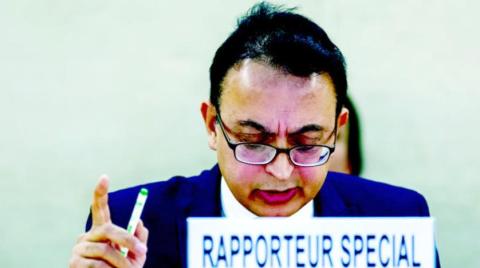
The United Nations Human Rights Council extended Tuesday the mandate of the Special Rapporteur on the situation of human rights in Iran, Javaid Rehman, for an additional year.
The extension was passed with 23 of the council's 47 members, as 16 members abstained from voting, and eight were against, including Cuba, China, Pakistan, and Vietnam.
AFP reported that the resolution expressed its "deep concerns" at the surge of executions and called on Iran to honor its own agreed legal obligations under international law and halt all executions for offenses "that do not meet the threshold of the most serious crimes or for alleged offenses committed before the age of 18 years."
The international rights body approved the resolution voicing "deep concern at the reported surge in the number of executions, including of individuals sentenced to death in relation to their alleged involvement in the recent protests."
Iran executed four people after the demonstrations erupted on September 16, following the death of Mahsa Amini, 22, who was arrested by the morality police.
According to the Norway-based Iran Human Rights (IHR) organization, at least 144 people have been executed this year.
Tuesday's resolution called for Tehran to "take all necessary legislative, administrative and other measures" to ensure no one is executed for "offenses that do not meet the threshold of the most serious crimes."
Iran must also ensure no executions are carried out "for alleged offenses committed before the age of 18 years" and that sentences are only handed down by "courts that are competent, independent and impartial," it said.
Beyond executions, the council deplored "systematic discrimination and violence based on gender, ethnicity, religion or belief or political opinion" in Iran.
Iran's ambassador Ali Bahreini took the floor to slam the resolution as a "weaponization of human rights as a foreign policy tool."
Last month, Rehman said in a comprehensive report on the recent protest that the "scale and gravity" of violations committed by Iranian authorities pointed to "the possible commission of international crimes, notably the crimes against humanity of murder, imprisonment, enforced disappearances, torture, rape and sexual violence, and persecution."
Rehman underscored an "absence of accountability at the domestic level" in Iran, noting that he looked forward to cooperating with a newly-established international mechanism "to ensure justice and accountability for victims of human rights violations."










